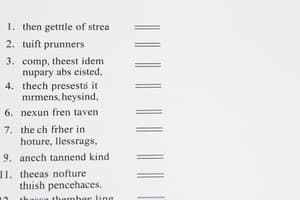Podcast
Questions and Answers
I ______ my grandmother yesterday.
I ______ my grandmother yesterday.
visited
He ______ already left when I arrived.
He ______ already left when I arrived.
had
The past tense of 'go' is ______.
The past tense of 'go' is ______.
went
I was ______ when the phone rang.
I was ______ when the phone rang.
They ______ been playing soccer before it started to rain.
They ______ been playing soccer before it started to rain.
She ______ a letter last week.
She ______ a letter last week.
Flashcards are hidden until you start studying
Study Notes
Simple Past
- Usage: Describes completed actions or situations that occurred at a specific time in the past.
- Form: Regular verbs add -ed (e.g., walk → walked). Irregular verbs have unique forms (e.g., go → went).
- Examples:
- I visited my grandmother yesterday.
- She wrote a letter last week.
Past Perfect
- Usage: Indicates an action that was completed before another action or time in the past.
- Form: Had + past participle (e.g., had seen, had finished).
- Examples:
- He had already left when I arrived.
- They had finished their homework before dinner.
Irregular Verbs
- Definition: Verbs that do not follow the regular pattern of adding -ed for the past tense.
- Common Examples:
- Be → was/were
- Have → had
- Do → did
- Go → went
- Come → came
- Note: It’s essential to memorize these forms.
Past Continuous
- Usage: Describes actions that were ongoing at a specific moment in the past.
- Form: Was/Were + verb-ing (e.g., was walking, were playing).
- Examples:
- I was reading when the phone rang.
- They were watching TV at 8 PM.
Past Perfect Continuous
- Usage: Indicates an action that was ongoing in the past and was completed before another past action.
- Form: Had been + verb-ing (e.g., had been studying).
- Examples:
- She had been working there for five years before she moved.
- They had been playing soccer before it started to rain.
Simple Past
- Describes completed actions or situations at a specific time in the past.
- Regular verbs form by adding -ed (e.g., walk → walked).
- Irregular verbs have unique past forms (e.g., go → went).
- Example sentences:
- "I visited my grandmother yesterday."
- "She wrote a letter last week."
Past Perfect
- Indicates an action completed before another action or time in the past.
- Formed using "had" + past participle (e.g., had seen, had finished).
- Example sentences:
- "He had already left when I arrived."
- "They had finished their homework before dinner."
Irregular Verbs
- Definition: Verbs that do not follow regular -ed pattern for past tense.
- Common examples include:
- Be → was/were
- Have → had
- Do → did
- Go → went
- Come → came
- Important to memorize irregular verb forms for proper usage.
Past Continuous
- Describes ongoing actions at a specific moment in the past.
- Formed using "was/were" + verb-ing (e.g., was walking, were playing).
- Example sentences:
- "I was reading when the phone rang."
- "They were watching TV at 8 PM."
Past Perfect Continuous
- Indicates an action ongoing in the past that was completed before another past action.
- Formed using "had been" + verb-ing (e.g., had been studying).
- Example sentences:
- "She had been working there for five years before she moved."
- "They had been playing soccer before it started to rain."
Studying That Suits You
Use AI to generate personalized quizzes and flashcards to suit your learning preferences.




